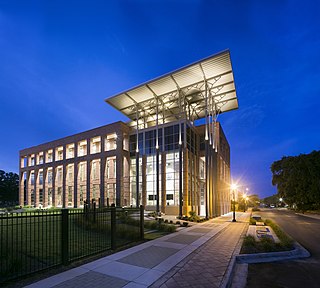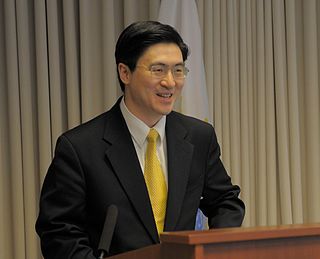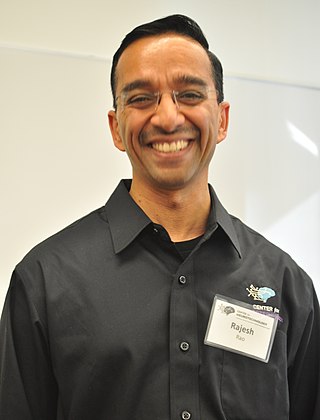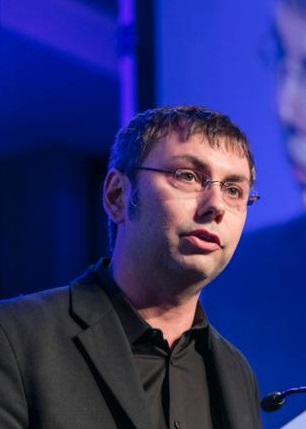Related Research Articles
The Alan T. Waterman Award, named after Alan Tower Waterman, is the United States's highest honorary award for scientists no older than 40, or no more than 10 years past receipt of their Ph.D. It is awarded on a yearly basis by the National Science Foundation. In addition to the medal, the awardee receives a grant of $1,000,000 to be used at the institution of their choice over a period of five years for advanced scientific research.
Ekaterini Panagiotou Sycara is a Greek computer scientist. She is an Edward Fredkin Research Professor of Robotics in the Robotics Institute, School of Computer Science at Carnegie Mellon University internationally known for her research in artificial intelligence, particularly in the fields of negotiation, autonomous agents and multi-agent systems. She directs the Advanced Agent-Robotics Technology Lab at Robotics Institute, Carnegie Mellon University. She also serves as academic advisor for PhD students at both Robotics Institute and Tepper School of Business.
Utkan Demirci is a tenured professor and a successful serial academic entrepreneur at Stanford University at the departments of Radiology and Electrical Engineering. He served as the Interim Division Chief and Director of the Canary Center at Stanford for Cancer Early Detection in the Department of Radiology.

S. Shankar Sastry is the Founding Chancellor of the Plaksha University, Mohali and a former Dean of Engineering at University of California, Berkeley.
Banu Onaral is the H.H. Sun Professor of Biomedical Engineering and Electrical Engineering at Drexel University in Philadelphia, Pennsylvania.

The Florida Institute for Human & Machine Cognition (IHMC) is a not-for-profit research institute of the State University System of Florida, with locations in Pensacola and Ocala, Florida. IHMC scientists and engineers investigate a broad range of topics related to building systems aimed at amplifying and extending human cognitive, physical and perceptual capacities.

Richard G. Baraniuk is the C. Sidney Burrus Professor of Electrical and Computer Engineering at Rice University and the Founder and Director of the open education initiative OpenStax.
The Presidential Young Investigator Award(PYI) was awarded by the National Science Foundation of the United States Federal Government. The program operated from 1984 to 1991, and was replaced by the NSF Young Investigator (NYI) Awards and Presidential Faculty Fellows (PFF) program. In 1995, the NSF Young Investigator program was subsumed into the NSF CAREER Awards program, and in 1996, the Presidential Faculty Fellows program was replaced by the PECASE program.

Mung Chiang is a Chinese-American electrical engineer and academic administrator who has been serving as the current and 13th president of Purdue University since 2023. He is the youngest president of a top-50 American university in recent history.

Rajesh P. N. Rao is the Director of the NSF Center for Neurotechnology (CNT) and the Cherng Jia and Elizabeth Yun Hwang Professor of Computer Science and Engineering and Electrical and Computer Engineering at the University of Washington in Seattle.
Radhika Nagpal is an Indian-American computer scientist and researcher in the fields of self-organising computer systems, biologically-inspired robotics, and biological multi-agent systems. She is the Augustine Professor in Engineering in the Departments of Mechanical and Aerospace Engineering and Computer Science at Princeton University. Formerly, she was the Fred Kavli Professor of Computer Science at Harvard University and the Harvard School of Engineering and Applied Sciences. In 2017, Nagpal co-founded a robotics company under the name of Root Robotics. This educational company works to create many different opportunities for those unable to code to learn how.
Ali Javey is a professor of electrical engineering and computer sciences at the University of California, Berkeley, a senior faculty scientist at the Lawrence Berkeley National Laboratory, and co-director of the Bay Area Photovoltaic Consortium and the Berkeley Sensor and Actuator Center. His research is focused on materials and device innovation for technological applications, particularly photovoltaics, wearable sensors, nanoelectronics, and programmable materials.
Nanshu Lu is an associate professor at the University of Texas at Austin where she leads the Lu Research Group in the department of aerospace engineering and engineering mechanics. She also holds a courtesy appointment in the department of biomedical engineering. Lu is recognized for her work on the integration of electronics into stretchable materials compatible with human tissue, for which she was named one of the Top 35 innovators under the age of 35 by the MIT Technology Review in 2012.
John X. J. Zhang is a tenured professor at Thayer School of Engineering of Dartmouth College, and an investigator in the Dartmouth-Hitchcock Medical Center. Before joining Dartmouth, he was an associate professor with tenure in the Department of Biomedical Engineering at the University of Texas(UT Austin). He received his Ph.D. in electrical engineering from Stanford University, California in 2004, and was a research scientist in systems biology at the Massachusetts Institute of Technology (MIT) before joining the faculty at UT Austin in 2005. Zhang is a Fellow of the American Institute for Medical and Biological Engineering (AIMBE), and a recipient of the 2016 NIH Director's Transformative Research Award.
Sarah Bergbreiter is a professor of Mechanical Engineering at Carnegie Mellon University, previously a professor at the University of Maryland. Her research specifically has focused on microrobotics, with projects influencing the medicine and consumer electronic spheres. She has given TED Talks highlighting her micro robots that can jump over 80 times their height. One such micro robot is the 4 millimeter "flea". She has won multiple awards for her work including the DARPA Young Faculty Award in 2008, the NSF CAREER Award in 2011, and the Presidential Early Career Award for Scientists and Engineers (PECASE) Award in 2013. Bergbreiter received her B.S.E degree in electrical engineering from Princeton University, and her M.S. and Ph.D. from the University of California, Berkeley.

Ryan M. Eustice is an American roboticist, and the Senior Vice President of Human-centric AI and Technology Adoption at the Toyota Research Institute (TRI). He is also a Professor of Robotics and Naval Architecture & Marine Engineering at the University of Michigan.
Xiuling Li is a distinguished electrical and computer engineering professor in the field of nanostructured semiconductor devices. She is currently the Temple Foundation Endowed Professorship No. 3 in Electrical and Computer Engineering and Fellow of the Dow Professor in Chemistry at the University of Texas at Austin. Previously, she was a Donald Biggar Willet Professor in Electrical and Computer Engineering and Interim Director of the Nick Holonyak Jr. Micro and Nanotechnology Laboratory at the University of Illinois at Urbana-Champaign.

Wei Gao is a Chinese-American biomedical engineer who currently serves as an assistant professor of medical engineering at the California Institute of Technology (Caltech). Gao has been a professor at Caltech since 2017 and is an associate editor of the journals Science Advances, npj Flexible Electronics (Nature), Journal on Flexible Electronics (IEEE), and Sensors & Diagnosis.
Charles Wyatt Shields IV is an American biomedical engineer and assistant professor at the University of Colorado Boulder in the Department of Chemical and Biological Engineering. His research involves the rational design of colloidal and supracolloidal particles for applications in drug delivery and biosensing.
Luca P. Carloni is a professor and chair of the Department of Computer Science at Columbia University in the City of New York.. He has been on the faculty at Columbia since 2004. He is an international expert on electronic computer-aided design.
References
- ↑ "Micro | Cambridge | Harvard Microrobotics Laboratory". Microrobotics.
- ↑ "Robobees. INSPIRED by the biology of a bee and the insect's hive behavior..." Archived from the original on 2014-03-17. Retrieved 2023-09-25.
- 1 2 3 "Robert Wood wins prestigious NSF CAREER and ONR Young Investigator program awards". News. Harvard University. 2 May 2008. Retrieved 12 September 2023.
- ↑ "2004". Ph.D. Dissertations. University of California, Berkeley. Retrieved 11 September 2023.
- ↑ Chea, Jacqueline S. (15 November 2018). "Harvard Engineering Professor Wood Awarded Medal for Work in Robotics". The Crimson. The Crimson. Retrieved 12 September 2023.
- ↑ Perry, Caroline (16 May 2014). "Robert J. Wood named National Geographic Emerging Explorer". News. Harvard University. Retrieved 12 September 2023.
- ↑ "NSF Honors Two Early Career Researchers With Alan T. Waterman Award". News. National Science Foundation. 10 May 2012. Retrieved 11 September 2023.
- ↑ "Technology Review: TR35". www.technologyreview.com. Archived from the original on 2008-12-09.
- ↑ "Two at SEAS win Presidential Early Career Awards". News. Harvard University. 10 July 2009. Retrieved 11 September 2023.
- ↑ "Air Force invests $12M for Young Investigators Research Program". News. Wright-Patterson Air Force Base. 16 October 2008. Retrieved 12 September 2023.
- ↑ "YFA Awardees 2006–2015" (PDF). DARPA. DARPA. Retrieved 12 September 2023.